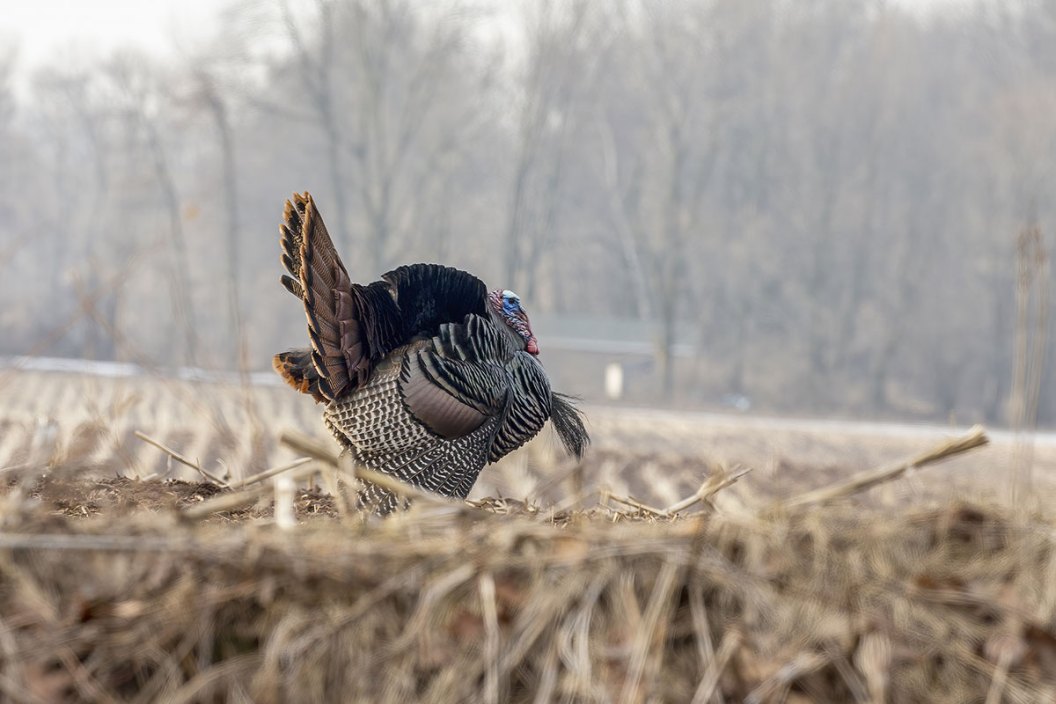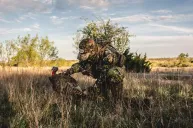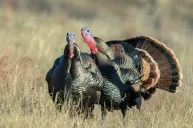Turkey hunting in the rain may be a blow to your comfort, but that doesn't mean it has to be unsuccessful.
The winter chill that's still in the air can quickly give way to the blue skies and warmer midday temps of spring. When that happens, it means one thing: turkey season is rapidly approaching!
Day by day, the anticipation of sudden pre-dawn gobbles breaking the early morning silence grows. By mid-March, some states' seasons are already underway.
However, with the spring gobbler season comes an inevitability: rainy days in the field. Sometimes that means a total downpour.
So, what can you do if your hunt falls on a "May Showers" kind of day? For one thing, you don't want to be the type that just packs it in!
I've done my share of turkey hunting in the rain. One hunt was even a guided hunt. It was pouring, but we promptly left camp at 3:30 am and got after it anyway. Why? Because the birds are still there!
It can be cold. Wet. Miserable.
But next to nothing stops the gobblers from doing what they do, so nothing should stop you.
Put that new issue of Turkey Country away, get out of the sleeping bag, and put the following tips to use. You just might bring that rainy-day longbeard home instead of reading about it.
Watching the Weather
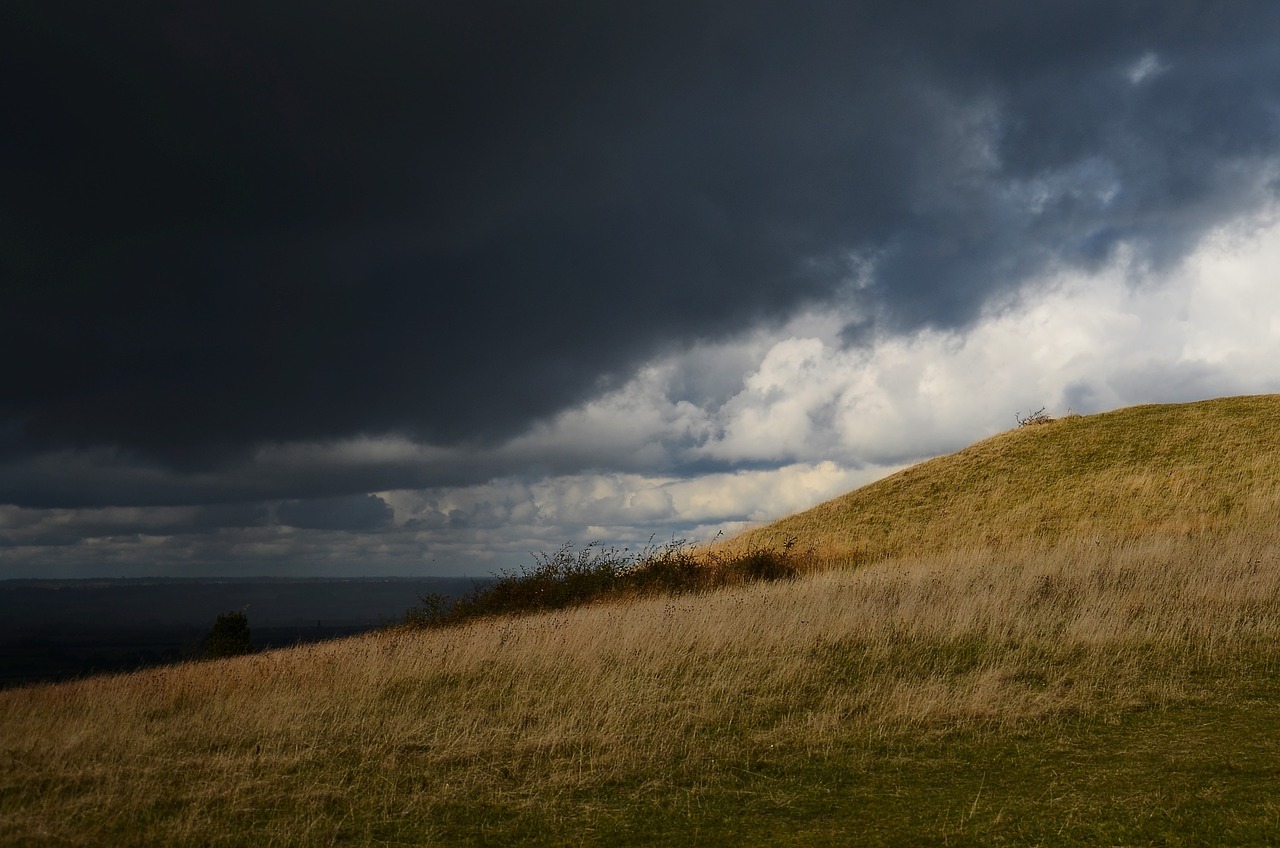
Definitely do monitor the weather via N.O.A.A. or your favorite weather service app within a week of when you plan to hunt. Doing so will give you an idea of what you will be dealing with, then you can plan accordingly.
At times, the weather report can be as reliable as Nostradamus. At others, they're just flat out wrong. But paying attention will make you better prepared to hunt during bad weather.
Some apps give a play-by-play by the hour. Use this data to strategize and look for windows of opportunity between squalls.
The big benefit is that hunting turkey in the rain isn't for everyone. Odds are you will probably have the woods to yourself while other turkey hunters sit it out. Play that to your advantage.
Rainy Day Turkey Hunting Tactics
In steady heavy rain, turkeys may go quiet. Gobbling can come to a halt and no matter what you throw at them, the turks won't give any verbal cues to locate them.
Even so, that doesn't mean they've packed up and headed out of town.
Likewise, windy days with or without steady rain can be an issue too. Such conditions create a great diversion for stalking deer but make hunting turkey a challenge. They can't hear you and you can't hear them, but a gobbler has far better eyesight than a deer.
Wild turkey may group in open areas during bad weather. This is done not only for strutting toms to be seen but also as a safety precaution against predators.
You can capitalize on this behavior by using a ground blind just inside an open field's edge. Not only will it keep some of the weather off, but you will be concealed from that wary, non-vocal, foul-weather tom.
Hopefully you have some intel about the area and can set it up as an ambush (if appropriate), or as a spot where you can call from to lure turkeys within range.
Calling during a rainstorm can still be an effective strategy, but you may really have to "turn it to eleven" if you want to cut through the wind or raindrops rat-a-tat-tatting on the leaves of those beloved hardwoods. The more volume and projection, the better.
Consider using a crystal or aluminum-surfaced pot call, as these will help broadcast yelps, cuts, and clucks further.
Roost 'Em
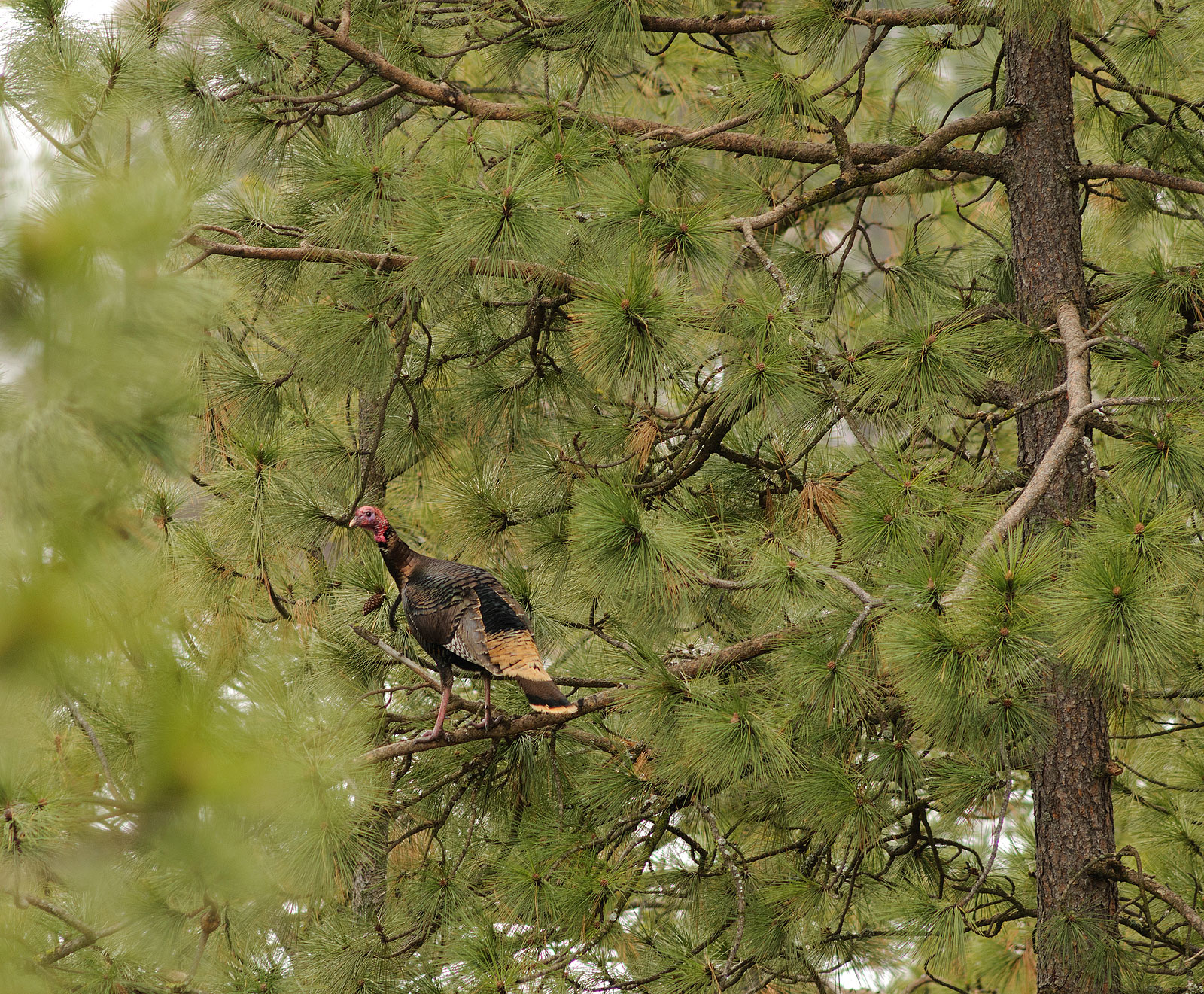
Roosting birds is another great tactic for those that are able to put them to bed. This is a highly effective strategy and my personal favorite way to hunt turkeys.
If you observe a bird fly up to its roost or locate one there because it gobbled, then half the battle is won! Look for open fields nearby and try to gauge where he will fly down to strut in the morning.
Just be prepared to wait longer than usual as they may take their sweet time to fly down when the weather is miserable.
Of course, it is completely possible to miscalculate and have the tom fly in the opposite direction, which has happened to me on occasion. Set up in a likely open area where you can see a good distance.
You want to set up close to the roost, but leave enough distance to hopefully avoid any surprises.
Decoys
Decoys are a great tactic for any weather and the rain is no exception! A more submissive positioned jake with a nearby hen is a good choice to help trigger a wet weather longbeard.
I've used many types, but have been loving the Avian X decoys the last few years. There are several brands that offer great quality and super-realistic strutter, jake, and hen decoys.
Gear to Consider When Turkey Hunting in the Rain
There are some definite gear considerations to make when preparing to slog it out during the rainy days of spring turkey season. Of course, what you need depends on if you will be on foot versus hunting from a blind.
Good footwear, Ziploc bags, turkey calls, rain gear, and ground blinds are at the top of my list when heading out to the stormy turkey woods.
Boots
Wet feet drive me nuts. I'll deal with it if I must but dry, happy feet equals happy hunting.
Feel free to go through the never-ending battle of treating hunting boots with a waterproofing solution or using Gore-Tex lined boots with marginal results. Let's be honest, by the end of the day most feet are still wet.
I'd go with thick synthetic blend socks and a rubberized boot like Lacrosse or Muck Boots. Not all of them offer the ankle support that a fitted boot does, but you probably won't be traipsing for miles either.
Need an extra tip? Throw in some heavy-duty Dr. Scholl's insoles for added comfort.
Turkey Calls, Ziplocs, and Bags
Whether you are using a turkey vest or a pack, a good practice for hunting inclement weather is to put everything in Ziploc bags. Hunting license, range finder, binos, turkey calls, strikers, you name it.
For box and pot calls, some hunters put theirs in an old bread bag. This is smart. Not only does it keep them dry, but you can cluck, putt, and purr from inside the bag if needed. You can do the same with a large 1 or 2-gallon Ziploc.
Keep your calls dry at all cost!
If you are adept at mouth calling, diaphragm calls can be a blessing in bad weather. Hands-free and without the worry of keeping them dry, this is probably the best possible option.
You can also opt for a waterproof box call like the Quaker Boy Hurricane Supreme or Primos Waterboard.
In my days of wildlife fieldwork, I learned to line my pack with a garbage bag. Doing this has also served me well on hunts. I recommend it!
If you are using a daypack, a pack cover is another option. Just make sure it's camouflaged and blends with the habitat you're hunting.
Rain Gear
Frogg Toggs makes great lightweight rain gear in various colors including camo. Again, ensure it blends with your environment's backdrop. If you are using rain gear in your ground blind, the obvious color choice is black.
If you are braving it out in the rain with your turkey lounger and a tree stand umbrella, go with camo. You get the idea.
Frogg Toggs also makes a good heavier poncho that you can throw in your vest or pack. It can be used as intended, to cover gear, or to cover a seat that has gotten wet.
Ground Blind
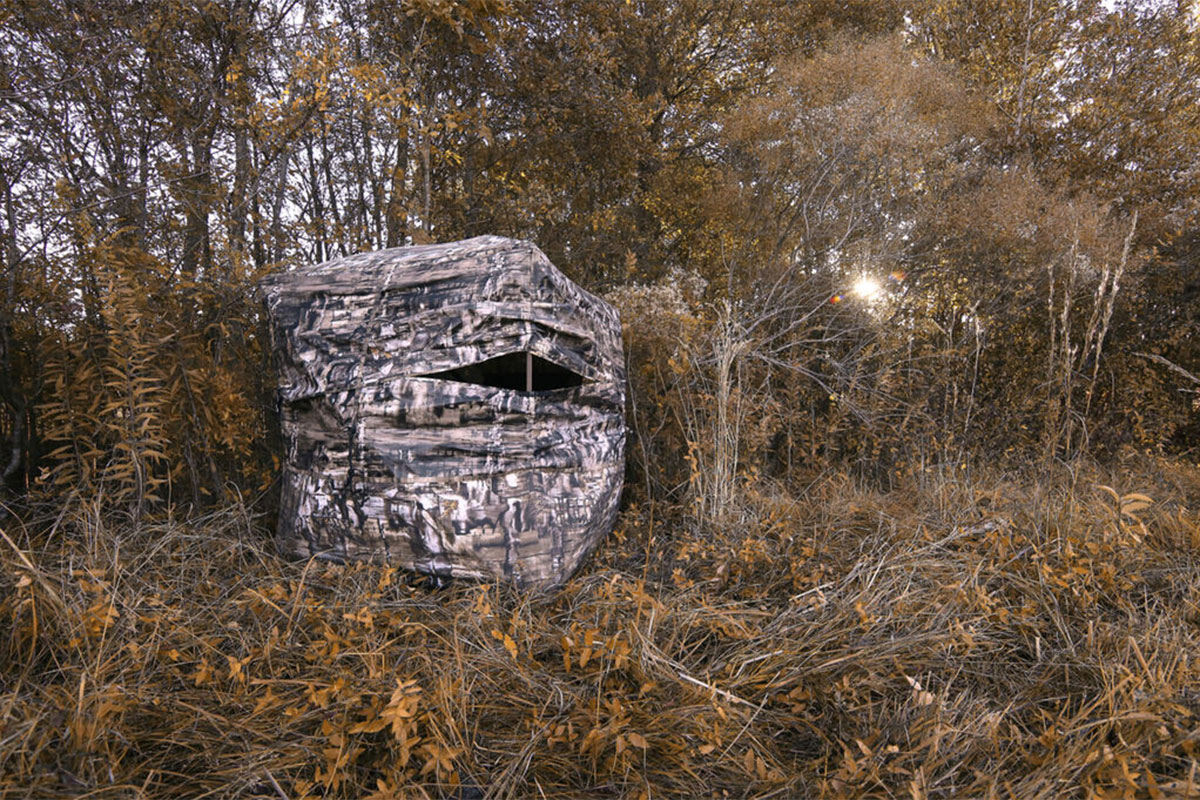
Sure, I unabashedly love my turkey lounger. Couple the lounger with a treestand umbrella and you have a fairly comfortable set-up for hunting turkey in the rain. Well, maybe a light rain.
However, nothing says "dry and ultra-comfort" like a ground blind. Throw in a Heater Buddy, and you have a turkey hunting Shangri-La.
Now, I've never known a pop-up-style ground blind to be waterproof. Those seams and all the little holes from the stitching - they drip. It always starts out the same. A drip here, a drip there. Drips run down the inside walls and as you watch it happen with more frequency, you hope the rain will stop.
Eventually, the rain gets heavier, the fabric gets saturated, and it starts coming through like a sieve. Everything inside including you gets drenched.
Sound familiar?
There are a couple of ways to approach this for an all-day sit during a downpour. Cuz Strickland from Mossy Oak talks about one way to treat your blind with a silicone-based spray in this video.
Another way to do it is to buy a 10' x 12' Mossy Oak or Realtree camo tarp at the hardware store. Leave it in the package and when the need arises, pull it out, unfold it, and simply sling it over the roof of the ground blind. This is my style of waterproofing method. Five minutes and you are done. Brush it in if you'd like.
Is it a little redneck? Possibly. But absolutely nothing is getting through that. You can elevate it, tie it down with guy lines or secure it how you see fit. It's fast, easy, no smell, and best of all, you won't have to leave your blind erected to dry out for days!
Follow these tips to help keep you out hunting during the rainy days this spring. Above all, don't forget to do your homework and scout, because these tenants of turkey hunting don't lose effectiveness just because of a little wet weather!
If you're planning on going into an animal's natural environment, you have to be prepared to face all of the natural elements.
Do that and you have a good chance of bringing that thunder chicken head-first into your turkey load... even in a rainstorm.
To sort through a selection of turkey gear, go to BassPro.com.
